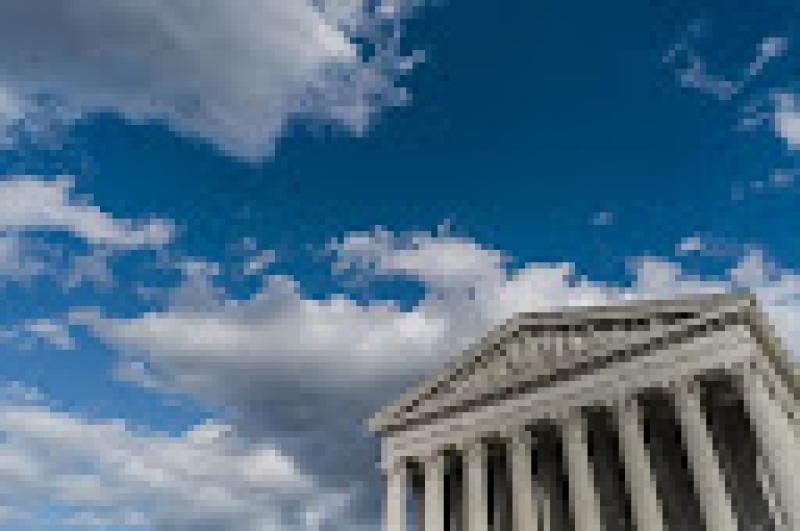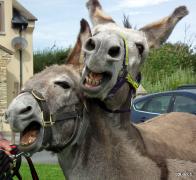Supreme Court may shield police from being sued over Miranda - Los Angeles Times
By: DAVID G. SAVAGE (Los Angeles Times)



WASHINGTON —
The Supreme Court justices, hearing arguments Wednesday in a Los Angeles case, sounded ready to shield police from civil lawsuits for failing to provide Miranda warnings to suspects.
The case — arising from a 2014 confrontation between a Los Angeles County sheriff's deputy and a hospital nursing assistant — seeks to answer for the first time whether officers who don't provide a Miranda warning can be sued for violating a suspect's constitutional rights. Such lawsuits would be in addition to having any coerced confessions thrown out of court.
The court's conservatives agreed Wednesday that the landmark 1966 Miranda decision bars forced confessions from being used in court. But they were skeptical of "extending" it to allow damage suits against officers who don't advise a suspect of the right to remain silent or consult a lawyer.
The outcome could have an effect on everyday encounters between police and people they question, some legal experts warn, if officers cannot be held liable for violating the Miranda rules.
At issue before the court Wednesday was the long-running debate over how to understand the Miranda decision and its required warnings.
Chief Justice John G. Roberts Jr. and Justice Amy Coney Barrett both noted that while the court had repeatedly upheld Miranda, it had always stopped short of describing the warnings as a "constitutional right."
Instead, they were described as rules or guidelines that protect a person's constitutional right against self-incrimination. Justice Clarence Thomas has long argued that Miranda should not be viewed as "a code of police conduct."
When Chief Justice Earl Warren handed down the ruling in Miranda vs. Arizona, it was lauded as a major new protection against forced confessions. But judges have been divided over whether the Miranda warnings are a constitutional right in themselves.
The Los Angeles case could finally provide clarification.
Los Angeles County Sheriff's Deputy Carlos Vega was called to County-USC Medical Center in 2014 to investigate a patient's complaint that an orderly had sexually assaulted her. The officer said nurses told him that Terence Tekoh had transported the heavily sedated patient to her room.
Vega said he took Tekoh to a private room to talk, and the orderly admitted he had "made a mistake" and agreed to write out a full confession.
Tekoh told a very different story, describing an hourlong confrontation. He said the deputy closed the door, accused him of groping the patient and falsely claimed the abuse had been captured on video.
Tekoh said that he asked to speak with a lawyer but that the deputy refused, blocked him from leaving and dictated a confession that he was required to write out and sign.
Tekoh was charged with a sexual offense, and his confession was introduced as evidence at his trial. Even so, the jury found him not guilty.
The orderly then sued Vega in federal court, accusing the deputy of violating his rights by not advising him of his rights and forcing him to confess to a crime.
A federal judge said Tekoh must prove the confession was coerced because the deputy's failure to give the Miranda warnings alone did not violate his right against self-incrimination. The civil jury ruled for Vega.
Lawyers for Tekoh appealed and cited a 2000 Supreme Court ruling by Chief Justice William H. Rehnquist that said the Miranda decision was a constitutional ruling that could not be overturned by Congress.
The U.S. 9th Circuit Court of Appeals agreed and said Rehnquist's opinion "made clear that the right of a criminal defendant against having an un-Mirandized statement introduced in the prosecution's case in chief is indeed a right secured by the Constitution."
And since federal civil rights law authorizes individuals to sue state and local officials who violate their "rights secured by the Constitution," Tekoh could sue Vega for a Miranda violation in a new trial, Judge Kim McLane Wardlaw said in a 3-0 decision.
In January, the Supreme Court agreed to hear Vega's appeal. He argued that while the Miranda decision was designed to protect the right against self-incrimination, it does "not itself create a constitutional right." Therefore, Vega and other police officers may not be sued for failing to give Miranda warnings, his lawyers said.
A Justice Department attorney also urged the court to throw out the suit against the officer.
"Miranda recognized a constitutional right, but it's a trial right concerning the exclusion of evidence at a criminal trial," said Vivek Suri, an assistant to the U.S. solicitor general. "It isn't a substantive right to receive the Miranda warnings themselves. A police officer who fails to provide the Miranda warnings accordingly doesn't himself violate the constitutional right."
Paul Hoffman, the Hermosa Beach attorney who represented Tekoh, said the officer violated the "core Miranda right." The officer questioned the orderly without advising him of his rights and pressured him to sign what he said was a false confession that was used against him in court. "What remedy does he have" if he cannot sue the officer? he asked.
Lawyers for police organizations urged the court to shield officers from being sued over the questioning of potential suspects.
But Charles Weisselberg, a UC Berkeley law professor, said he fears police will be given an incentive to pressure people who refuse to talk.
"If the court rules for Deputy Vega, there will be no penalty for violating Miranda in this way," he said. "There will be zero incentive for officers to cease questioning."
In the 1990s, California police were sometimes urged to question people "outside Miranda," he said. They did so, he said, because they could learn details about a crime, the location of weapons or evidence that could be used against an uncooperative defendant.
That practice ended, Weisselberg said, only when the 9th Circuit Court ruled police could be held liable for violating Miranda rights.
The court has been criticized in recent years for a series of rulings that gave police a "qualified immunity" from being sued for violating the rights of people they searched or arrested. The decision in Vega vs. Tekoh may add to that list.

 Article is LOCKED by author/seeder
Article is LOCKED by author/seeder






Trolling, taunting, spamming, and off topic comments may be removed at the discretion of group mods. NT members that vote up their own comments, repeat comments, or continue to disrupt the conversation risk having all of their comments deleted. Please remember to quote the person(s) to whom you are replying to preserve continuity of this seed.
I don't think I like where this is headed.
there's some loose ends that trumpsters need to tie up before the next insurrection...
AFAIC any attempt to violate my constitutional rights falls under my right of self defense.
to bad police academies don't spend as much classroom time on de-escalating situations as they do on how to violate somebody's civil rights. this is the reason why I'm armed to the teeth when I drive thru the south.
I'm not dumb enough to put myself in that kind of position so I really don't know. So I have to ask, what is provided to prove a Miranda warning was given?
There's also some common sense stuff that Tekoh failed to do.
People can do strange things when held for hours on end.
I may be wrong but I thought the Miranda was for people that were arrested. Advising them of their rights and what they are entitled to.
That's what I thought, too. I'm with you, I don't think any of us are going to like it. Then it truly would be a police state
The entire purpose of the Miranda Rights is to prevent law enforcement from coercing or forcing people being questioned to incriminate themselves. The Miranda Rights were created to defend the 5th Amendment right against compelled self-incrimination, and to uphold the 6th Amendment right to a lawyer.
That's what I thought to. But, like I said, I've never put myself in that type of situation.
nobody should ever answer questions from LE involuntarily. the only statements you should ever make are "am I being detained" and "am I free to go". if you don't get the right answers to either question, the only other words you should utter in their presence is phone call or lawyer.
Being interrogated by the police is a very intimidating and in most cases an unconstitutional act. Most police interrogations use techniques I learned as an Interrogator/Translator for the military. Why in the F%$# are military techniques being used on Civilians? Do you become a Prisoner of War when you are apprehended and IF so are you accorded your rights under the Geneva Convention and Law of Land Warfare?
If you are not a POW then police have NO right to use these abusive techniques on CIVILIANS.
I think it’s an interesting case, at the very least. I don’t know if I would say specifically that a person has a right to the Miranda warning per se, but I would argue that they have a right to be protected from self-incrimination facilitated by a government agent.
The right to not incriminate yourself is for sure in the Constitution but cops try to go around that right all the time with bullshit trickery. For example:
Is this not obvious bullshit, on its face? To pretend that some consensual conversation was taking place and they only desired privacy? This insults the intelligence of anyone who hears it. If a cop takes you to a room and closes the door, any reasonable person would think they are being detained and are not free to leave. This makes the conversation custodial, and that activates Miranda.
Then there’s this:
Cops lie to people every day to trick them out of protecting their Constitutional rights. That should not be allowed and should be seen as a violation of a person’s rights (for which the victim should be able to sue).
It really yanks my chain that law enforcement can lie to the alleged perp but even innocent people can get into trouble if they lie to cops. That's not right
ronnie raygun and bush jr shot most of the amendments full of holes...
Cops lie, prosecutors lie, labs lie. After the Siege at Wounded Knee, 1973 there were 400 arrests by the feds and 275 cases filed. The government/prosecutors lied and hid evidence that resulted in 94% of the cases resulting in not guilty findings or cases dropped against the Native Americans arrested. The trial of Dennis Banks and Russell Means (leaders of AIM) lasted 8 months and resulted in all charges being dropped.
If you are arrested don't volunteer any information. don't sign anything and immediately request legal representation.
They are not there to help you, so don't help them.
Mr Giggles tells me that all the time. It's good advice
ugh. I hate voting up your comments, but when you're right, you're right...
"You have the right to remain silent. You have the right to cable TV." (Steve Guttenburg....Police Academy)